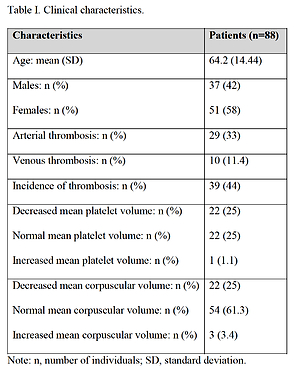Current issue
Archive
Manuscripts accepted
About the Journal
Editorial office
Editorial board
Section Editors
Abstracting and indexing
Subscription
Contact
Ethical standards and procedures
Most read articles
Instructions for authors
Article Processing Charge (APC)
Regulations of paying article processing charge (APC)
HEMATOLOGY / RESEARCH PAPER
Genetic factors that may affect the risk of developing thrombosis in patients with myeloproliferative disorders
1
Lithuanian University of Health Sciences, Institute of Oncology, Oncology Research Laboratory, Lithuania
2
Lund University Faculty of Science, Department of Biology, Sweden
3
Department of Oncology and Hematology, Institute of Oncology, Lithuanian University of Health Sciences, Lithuania
Submission date: 2020-12-29
Final revision date: 2021-04-29
Acceptance date: 2021-07-21
Online publication date: 2021-08-04
Corresponding author
Roberta Vadeikienė
Lithuanian University of Health Sciences, Institute of Oncology, Oncology Research Laboratory, Lithuania
Lithuanian University of Health Sciences, Institute of Oncology, Oncology Research Laboratory, Lithuania
KEYWORDS
TOPICS
ABSTRACT
Introduction:
Patients with Philadelphia-negative (Ph-) myeloproliferative neoplasms: primary myelofibrosis, essential thrombocythemia and polycythemia vera; often develop thrombotic events. It was suggested that the genetic variants that are responsible for blood coagulation and elevated homocysteine level play causal role in the occurrence of thrombosis. Our aim was to evaluate the single nucleotide polymorphisms in PROS1, EPCR, PROC, MTHFR, MS genes and their associations with the risk of developing thrombosis as well as clinical characteristics in patients with myeloproliferative disorders.
Material and methods:
The screening of PROS1 g.66847T>C, EPCR c.4678G>C, EPCR c.6936A>G, PROC c.565C>T, MTHFR c.677C>T, MTHFR c.1298A>C, MS c.2756A>G polymorphisms was performed at Lithuanian University of Health Sciences, Kaunas, Lithuania. The PCR-RFLP method was applied.
Results:
After genotyping 88 patients with Ph- myeloproliferative disorders, the association was found between venous thrombosis and MTHFR c.1298A>C (p=0.019). Regression analysis revealed that carriers of PROS1 66847TC, EPCR 4678GC, 6936AG or GG, PROC 565CT or TT, MTHFR 677CT, MS 2756AG genotypes were associated with a lower risk of developing venous thrombosis. EPCR 6936AG genotype could be considered as a protective factor against arterial thrombosis. Genotypes PROC 565CT and 565TT were associated with a lower risk of decreased levels of MPV, 565TT carriers were less likely to develop arterial or venous thrombosis, compared with those carrying the CC or CT genotype.
Conclusions:
It can be concluded that more research into these polymorphisms needs to be performed, since there are many conflicting results published regarding the complexity of the possible interactions between these gene variants and predisposition to thrombotic events.
Patients with Philadelphia-negative (Ph-) myeloproliferative neoplasms: primary myelofibrosis, essential thrombocythemia and polycythemia vera; often develop thrombotic events. It was suggested that the genetic variants that are responsible for blood coagulation and elevated homocysteine level play causal role in the occurrence of thrombosis. Our aim was to evaluate the single nucleotide polymorphisms in PROS1, EPCR, PROC, MTHFR, MS genes and their associations with the risk of developing thrombosis as well as clinical characteristics in patients with myeloproliferative disorders.
Material and methods:
The screening of PROS1 g.66847T>C, EPCR c.4678G>C, EPCR c.6936A>G, PROC c.565C>T, MTHFR c.677C>T, MTHFR c.1298A>C, MS c.2756A>G polymorphisms was performed at Lithuanian University of Health Sciences, Kaunas, Lithuania. The PCR-RFLP method was applied.
Results:
After genotyping 88 patients with Ph- myeloproliferative disorders, the association was found between venous thrombosis and MTHFR c.1298A>C (p=0.019). Regression analysis revealed that carriers of PROS1 66847TC, EPCR 4678GC, 6936AG or GG, PROC 565CT or TT, MTHFR 677CT, MS 2756AG genotypes were associated with a lower risk of developing venous thrombosis. EPCR 6936AG genotype could be considered as a protective factor against arterial thrombosis. Genotypes PROC 565CT and 565TT were associated with a lower risk of decreased levels of MPV, 565TT carriers were less likely to develop arterial or venous thrombosis, compared with those carrying the CC or CT genotype.
Conclusions:
It can be concluded that more research into these polymorphisms needs to be performed, since there are many conflicting results published regarding the complexity of the possible interactions between these gene variants and predisposition to thrombotic events.
Share
RELATED ARTICLE
We process personal data collected when visiting the website. The function of obtaining information about users and their behavior is carried out by voluntarily entered information in forms and saving cookies in end devices. Data, including cookies, are used to provide services, improve the user experience and to analyze the traffic in accordance with the Privacy policy. Data are also collected and processed by Google Analytics tool (more).
You can change cookies settings in your browser. Restricted use of cookies in the browser configuration may affect some functionalities of the website.
You can change cookies settings in your browser. Restricted use of cookies in the browser configuration may affect some functionalities of the website.



